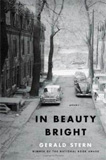Review by Arthur McMaster
W.W. Norton
500 Fifth Avenue
New York, New York 10110
ISBN: 978-0-393-08644-7
2012, 128 pp., $25.95
www.wwnorton.com
In the often breathless, stream-of-consciousness-poems of Gerald Stern all observations, perhaps like politics, are local. The man’s senses are acute. This, the poet’s seventeenth volume, is apportioned into three parts, although there seems to be nothing thematic that separates or unites them. That said, the poems become less abstract as we move along.
In a representative poem of Part I, titled “Aliens,” Guatemalans are afoot in New York City. They contemplate the flower mart “sitting by the ice machine and there the / bargaining takes place…” But bargaining for what lies just out of reach for the reader. For way-out-of-towners, any activity in the city is maybe worthy of scrutiny. Most poems in this first section are frankly unlyrical, asyntactical. They make little sense, rather like dreams that appear vivid and imagistic, but no one can say what they mean, come dawn.
Fragments and allusions can work well in the body of lyrical poems as long as the reader has some sense of direction, something tangible to grasp, rather as Emily Dickinson used the word “spar” to suggest a load bearing device or structure. The title poem, “In Beauty Bright,” concludes this peculiar series with a wave to William Blake and his delightful, four-line poem, from his 1908 volume Songs of Experience, “The Lily.” Thorny as this section of Mr. Stern’s book may be, brightness looms just ahead.
The return to poetry terra firma comes with Part II. Whatever the poet was up to over his first fifty-six pages or so, the verbal dyspepsia has passed and we now get some terrific work. Not that Stern wants the reader to catch much of a breath: these move fast. They weave and enchant. Consider “Iberia,” one of the most beguiling.
I have been here so long I remember Salazar
and how he tortured my four main poets in Portugal
with his ‘moral truth and patriotic principles,’
and fatherless Coughlin and all the old bastards
that stretched in one great daisy chain from the coast
of California east, and east to New York
and London and thence across Eurasia to God knows
what small moral and patriotic islands
so listen to me for once and hate for good
all moral islands, and if you haven’t done so,
already add my Pessoa to your Lorca.
It’s brilliant on several fronts, including the recollection of Portugal’s coup, in 1936, that brought Dr. António Salazar to power bleating for “social justice.” But what fascinates me here all the more, as a cranky academic, is the hidden conjunction of old Walt Whitman and his mid-19th Century work for both the Portuguese Fernando Pessoa (writing as Álvaro de Campos) and the Spaniard Garcia Lorca. It is doubtful the two poets ever met. Surely Gerald Stern knows this, but he tempts Dear Reader to locate the shared energy, if not the “moral islands,” that fix the poem. Iberia, as title, of course covers both nations, muting the anomaly. Bravo, sir!
What else? I am at least half, if not three-quarters, enchanted with Stern’s wonderfully sublimated political commentary such as we find in the poem “Hyena” (epigraph Richard Nixon). Try to keep the image of hyena in mind as you read. Here we go:
The fact that his front legs were longer than his rear
or should I say his arms, it made it possible
while hunching over—-shouldering—-to give the
two-handed V for Victory signs and do his
smiling just before he boarded the airplane.
Stupidity I, but made it hard to drink
his tea unless he doubled his wrist but such
it is for hyenas when they leave the capital
and such it is they grin—-I saw his death
in Chicago over four hundred television stations,
eating ice cream and waiting: there was only
one poet in the whole airport going from
station to station crying “asshole” and watching
his friend Clinton drop a tear for him
in 1993, and ah, you didn’t have
Hyena to kick around much any longer.
See how much political fun you can have with poems that embrace anthropological whimsy. There are many more excellent poems within Stern’s highly eclectic volume, especially so in the final section. “Angle of Death” reimagines the poet Celan and the death of Rembrandt. But the one I will come back to is “Creeley,” for the late poet of the Black Mountain College, a poem dedicated to James Haba, founding director of the Dodge Poetry Festival. Robert Creeley, in the mind’s eye of the poet, swallows 2000 stars in his “unbearable sadness” while Bly, Olds, and Levine cannot help. Must leave him to his melancholy. Perhaps the image is apt, though once—it would be wrong of me to deny it—I did see the man smile.